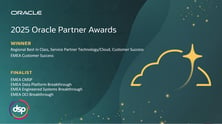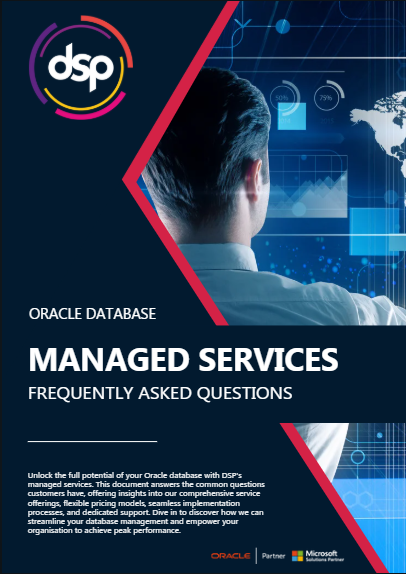Secure, Scalable, and Optimised: Database Managed Services by DSP
A DSP Database Managed Services goes beyond maintenance and turns database operations into a driver of business performance. Working across all major hyperscalers and database platforms, our ASCEND methodology ensures your critical systems are secure, resilient, and optimised for efficiency. Whether operating on-premises, in the cloud, or with a hybrid model, we deliver measurable outcomes - reducing operational costs by up to 70%, minimising downtime, and aligning your database strategy with your long-term business goals.
Reduce costs, minimise risk, and optimise performance at scale
DSP’s database managed services delivered via our ASCEND framework operate as a strategic partnership, enabling you to streamline operations and enhance performance. We work in partnership with enterprises to deliver resilient, cost-optimised database environments that reduce operational spend by up to 70% while ensuring reliability at scale.
We work across all major cloud platforms and on-premise environments, providing flexible services tailored to your organisation’s needs. Whether acting as an extension of your team, delivering out-of-hours coverage, or taking full ownership of your database estate, our ASCEND approach prioritises proactive monitoring, predictive health checks, and continuous optimisation.
With DSP as your strategic partner, database management becomes a source of stability and efficiency, not a drain on resources. We safeguard performance, cost-effectiveness, and security so your teams can focus on delivering business outcomes with confidence.
Get in Touch
DSP's ASCEND framework
ASCEND redefines the traditional managed service provider relationship. DSP becomes a central business partner focused on delivering value that extends far beyond IT. Support becomes a strategic function - delivering secure, efficient and future-ready solutions to accelerate your goals and align outcomes with your broader business vision.
Align
Align IT strategy, AI initiatives, and operational processes directly with overall business goals and digital transformation. Ensure AI investments are purpose-driven and contribute directly to your organisation's strategic objectives.
Secure
Secure the entire enterprise with proactive cybersecurity, leveraging AI-driven threat detection and response, alongside robust data governance and compliance. This intelligently protects your organisation from escalating threats, ensures regulatory adherence, and maintains business continuity.
Consolidate
Consolidate/Control and optimise IT infrastructure, applications, and vendor relationships for maximum efficiency and cost-effectiveness, utilising AI for predictive operations and resource management. This propels significant operational savings, reduces complexity, and sustainably optimises IT resource utilisation through intelligent automation.
Enable
Enable a highly productive and effective workforce through seamless digital experiences, modern applications, and AI-powered tools for enhanced collaboration and automation. This elevates employee satisfaction and efficiency, supporting agile work environments with intelligent assistance.
Navigate
Navigate the adoption, integration, and ethical deployment of AI and advanced data analytics, transforming information into strategic assets for the business. This unlocks new insights for decision-making, enables innovation, and ensures the responsible and impactful implementation of AI across the organisation.
Demonstrate
Demonstrate clear and quantifiable business value from IT and AI investments, providing transparency and accountability to the leadership team. This positions IT and AI as fundamental to business operations, demonstrates tangible ROI, and solidifies IT's position as a strategic and vital function of the business.
Our Customer Sentiment Score proves we’re a safe pair of hands.
DSP is the only company to be identified as a ‘Rising Star’ in all four quadrants in the latest ISG's Provider Lens™ evaluation for Oracle Cloud and Technology Ecosystem Europe 2024.
"DSP pairs disciplined engineering with AI-centric innovation, integrating OCI workloads across clouds while safeguarding them with ML-powered vulnerability scanning."
Roman Pelzel
Lead Analyst ISG
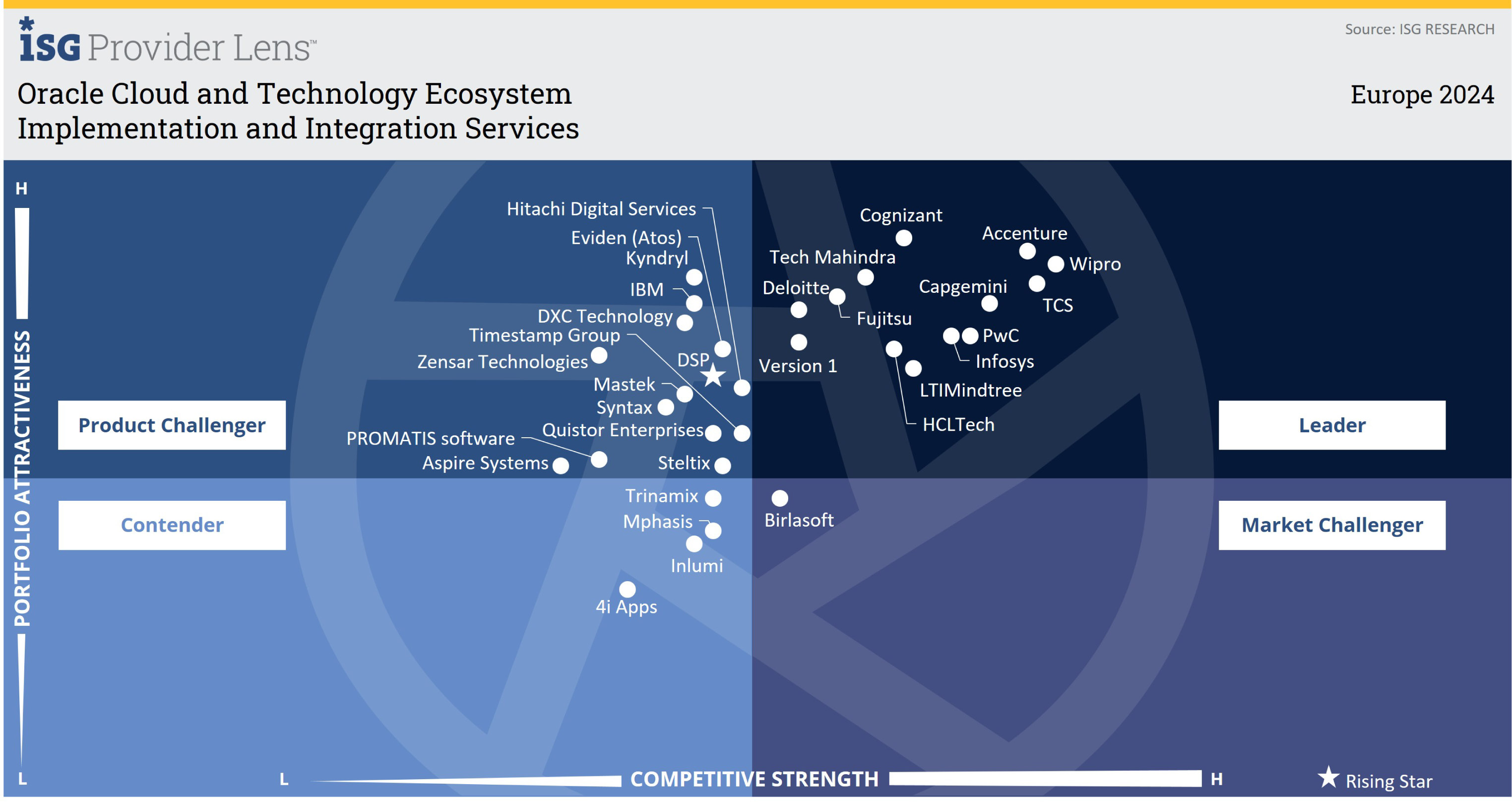
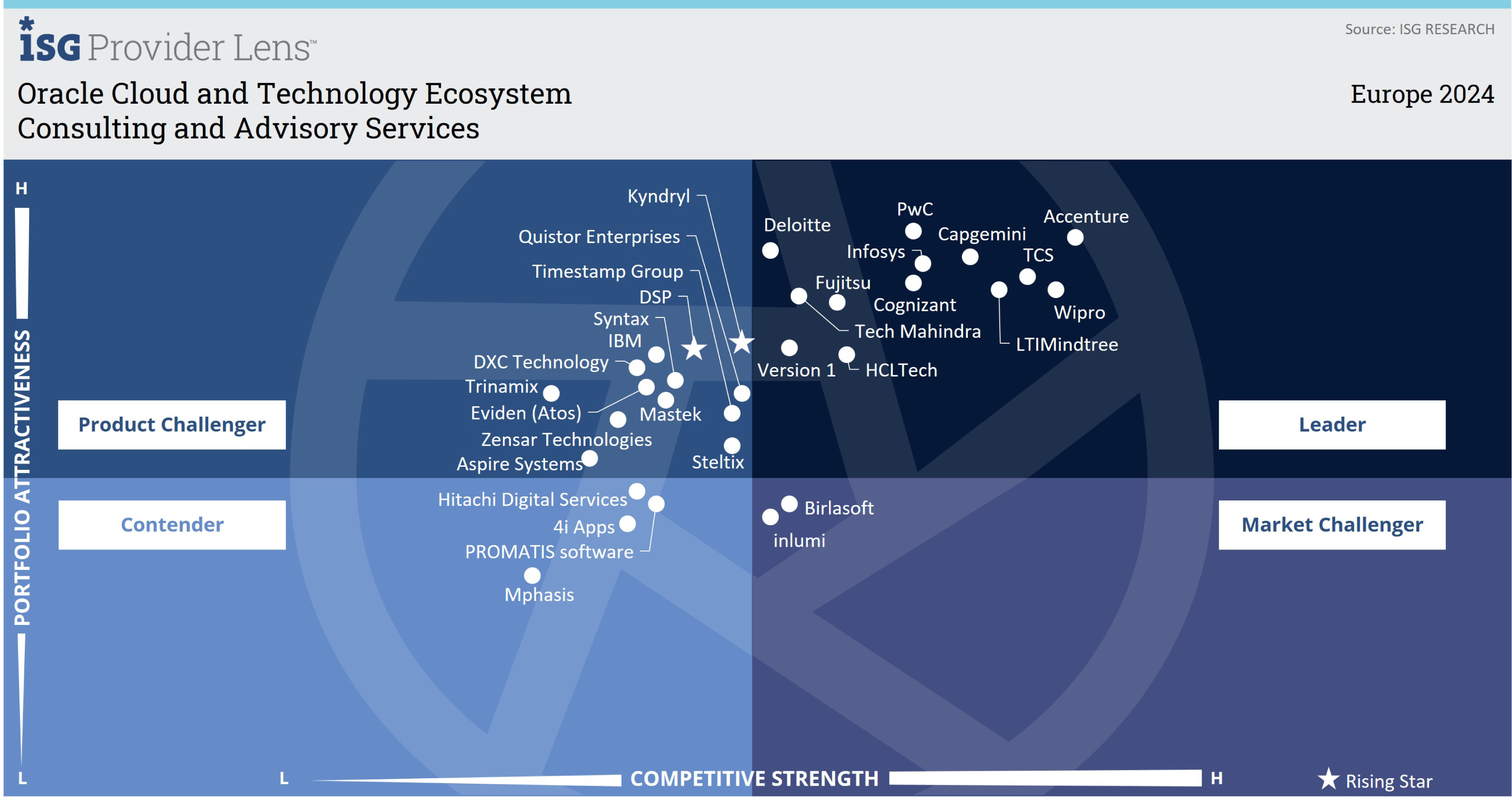
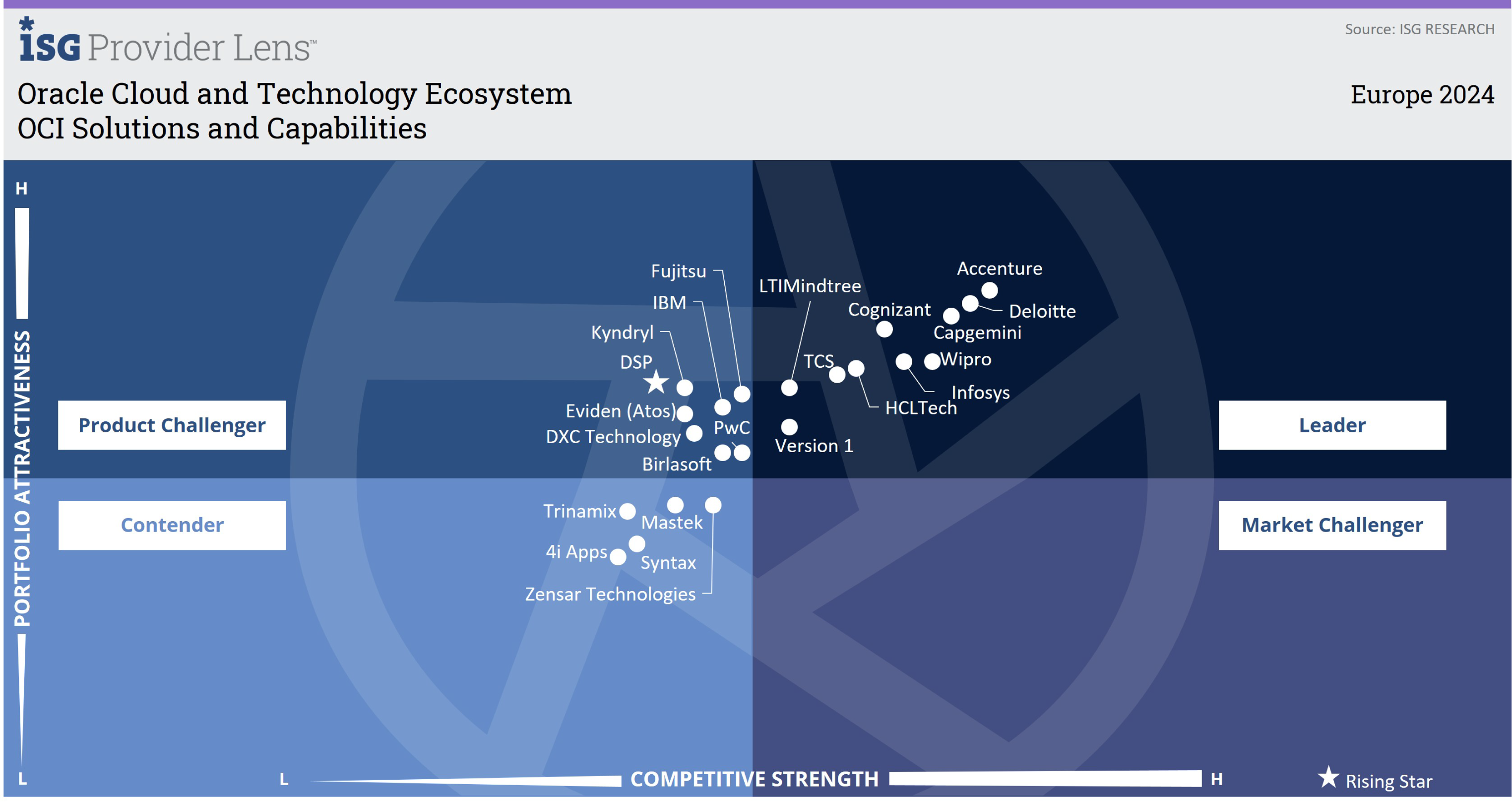
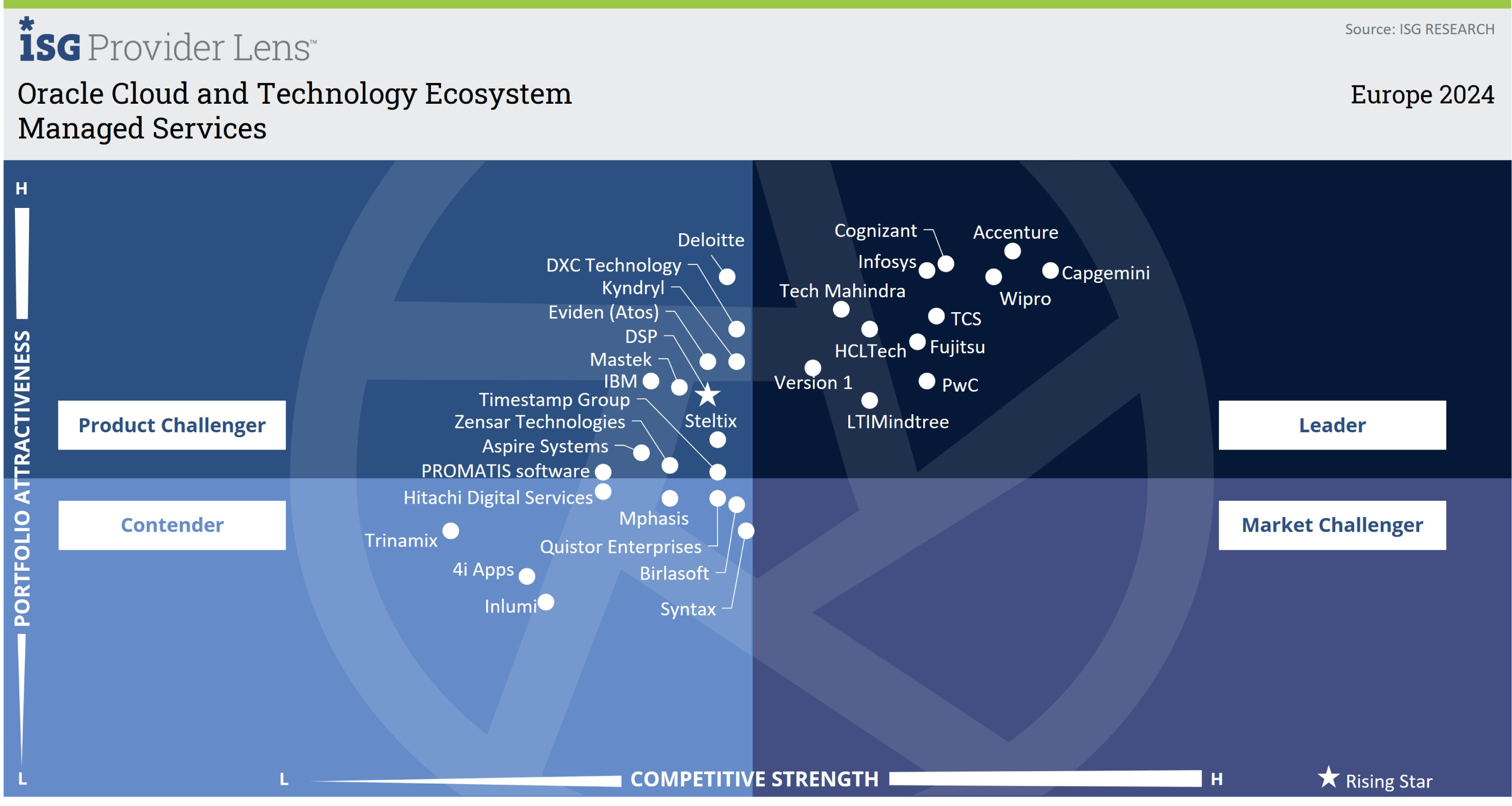
DSP Database Managed Services
Key features:
Key outcomes:
-
24x7x365 performance monitoring & alerting
-
Flexible and reliable support
-
A team of experts with a vast collective knowledge
-
Weekly, monthly or quarterly health checks
-
Hotline support service
-
Management information reporting
-
Dedicated customer support portal
-
Typical reduction in operational costs of up to 70%
-
Continuous maintenance and automated patching
-
Proactive database performance tuning
-
Minimised downtime and greater performance
-
Reduced knowledge loss if an in-house DBA moves on
-
Filled skills gaps in your in-house team
-
Be up to date with the latest technology without needing to invest in training
Trusted by some of the biggest brands


.png)
.png)

.png)

.png)

.png)


Frequently Asked Questions
How do I choose a managed services provider for database administration?
When choosing a managed services provider for database administration, look for proven expertise across your database platforms (e.g., Oracle, SQL Server, or cloud databases), 24/7 proactive monitoring and a strong track record in performance optimisation and security. The right provider should offer flexible support models, certified DBAs and clear SLAs that align with your business goals. Check for industry recognition, customer success stories and the ability to scale as your data environment grows.
What are the main benefits of using managed services for enterprise databases?
The main benefits of using managed services for enterprise databases include improved performance, enhanced security and reduced operational costs. With proactive monitoring and regular health checks, managed service providers prevent issues before they impact the business. Enterprises also gain access to certified database experts, 24/7 support and scalable solutions across on-premise and cloud environments. This ensures higher availability, faster recovery times and frees internal teams to focus on strategic innovation rather than day-to-day database maintenance.
What is the difference between managed database services and traditional database consulting?
The key difference between managed database services and traditional database consulting lies in scope and continuity. Managed database services provide ongoing, proactive management, monitoring, and optimisation of your databases; ensuring 24/7 performance, security, and uptime. In contrast, traditional database consulting is typically project-based, focusing on one-time activities like migrations, upgrades or troubleshooting. Managed services act as an extension of your IT team with continuous support, while consulting engagements deliver short-term expertise for specific database challenges.
What features should I look for in a managed service contract for database support?
When reviewing a managed service contract for database support, look for clear SLAs covering uptime, response and resolution times. Ensure it includes 24/7 monitoring, proactive maintenance, regular health checks and security patching. The contract should offer scalable support tiers, transparent pricing and defined escalation paths. Also prioritise providers that include performance optimisation, backup and disaster recovery, and access to certified database experts. Finally, check for reporting and governance reviews to ensure accountability and continuous improvement.
Do you provide managed services for cloud-based database platforms?
Yes! We do provide managed services for cloud-based database platforms.
Our team covers any database and any cloud, including platforms such as Oracle Cloud Infrastructure (OCI), Microsoft Azure, Amazon Web Services (AWS) and Google Cloud.
Can managed services improve database security and compliance?
Yes. Managed services can improve database security and compliance by providing proactive monitoring and threat detection, regular patching and updates, and robust access controls and encryption. They also offer automated auditing and reporting to meet regulations like GDPR, HIPAA, or SOX, along with disaster recovery and backup management to ensure data integrity. By combining expert administration with continuous security oversight, managed services reduce risk and help organizations maintain compliance without straining internal teams.
How to choose the best managed services for small businesses?
For small businesses, the best managed services are those that offer affordable, flexible pricing and can scale as the business grows. They should provide proactive security, regular updates and compliance support to protect sensitive data without requiring in‑house expertise. Quick response times and clear SLAs are essential, along with a partner who understands the needs of small businesses, offers hands-on support and helps align IT with business priorities rather than just fixing problems as they arise.
Does DSP provide managed services for large-scale database environments?
Yes, DSP provides managed services for large‑scale database environments, covering on‑premises, hybrid and cloud architectures. Our services include 24/7 monitoring, proactive health checks, performance tuning and security management for enterprise-grade workloads. DSP’s scalable, cost-efficient approach ensures high availability, reduced downtime and aligns database operations with business objectives, supporting complex, mission-critical databases across multiple platforms and cloud providers.
How to evaluate managed service providers for compliance with UK data regulations?
To evaluate managed service providers for compliance with UK data regulations, ensure they follow GDPR and UK data protection laws, provide clear data handling and storage policies, and offer audit trails, encryption, and access controls. Check for regular compliance reporting, certifications, and experience with UK-specific regulations. A reliable provider should demonstrate proactive risk management and include contractual commitments to protect sensitive data and support regulatory audits.
What are your pricing models for managed database services in the UK?
Managed database services in the UK typically use flexible pricing models, including fixed monthly fees, per-database or per-instance charges, usage-based costs, or tiered service bundles. There are also hourly or project-based rates for ad-hoc support available. When choosing a provider, it’s important to understand what’s included, such as monitoring, backups, support, and scalability, to ensure the pricing aligns with your business needs.
What is the cost comparison of managed services vs. in-house IT support?
Managed services typically offer lower upfront costs and predictable monthly fees compared with in‑house IT support, which requires salaries, benefits, training, tools, and infrastructure. Managed services provide access to a broader range of skills, 24/7 monitoring and proactive maintenance, while in‑house teams can be more expensive to scale and maintain. For many businesses, outsourcing IT support can reduce overall costs while improving efficiency and expertise.
Do you have any reviews for being a trusted managed service provider specialising in database solutions?
Yes, we do. At DSP we are a trusted managed services provider specialising in database administration and support for enterprise‑grade environments. Our website features a range of client testimonials from organisations such as Lancashire Constabulary, Ocado and Torbay Council, who praise our technical knowledge, reliability and responsiveness.
We have also published numerous case studies showing how we’ve managed complex database estates and achieved measurable business outcomes.
DSP Oracle Managed Service FAQ
Find the answers to your frequently asked Oracle Managed Service questions. This document covers common inquiries related to implementation, maintenance, performance, security and more.
Enter your email to download...
Our thinking
 JavaScript
JavaScript
Adding Payments to Oracle APEX Using Stripe
Adding payments to an Oracle APEX application is one of those things that sounds intimidating, but in reality follows a fairly standard pattern once...
Jamie Lambertstock25-Feb-2026 15:58:29
 Oracle Managed Service
Oracle Managed Service
What are the Benefits of outsourcing Managed Services?
In an era where data is often called the "new oil," managing the infrastructure that stores and processes that data has never been more complex. For...
Doria Sacer16-Feb-2026 14:53:32
 Mobile applications
Mobile applications
Mobile-Compatible vs Mobile-Centric APEX Apps
Oracle APEX is an excellent low-code platform that can display content on a variety of device types and screen sizes, including desktop, tablet, and...
Michael Pickering11-Feb-2026 15:41:52
 Microsoft
Microsoft
Modernising Data Integration: The Benefits of Migrating from ADF to Microsoft Fabric
As organisations modernise their data platforms, traditional data integration tools are being re-evaluated in the context of cloud-native analytics...
Pujitha Chennupati29-Jan-2026 09:08:04

Mike Sowerbutts
Head of Managed Services


.png?width=250&height=56&name=stonewater-logo%20(1).png)
